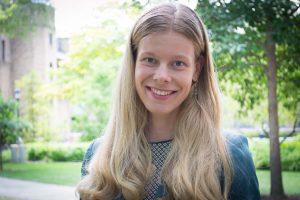 By Jacob Nelson
By Jacob Nelson
The term “big data” is everywhere these days, including the creative enterprises. Agnes Horvat’s Culture and Art Analytics course introduces MSLCE students to big data, and equips them with the skills to use big data in cultural markets.
“Big data is basically a buzzword and there is so much of it available now to everyone,”Horvat said. “It requires some knowledge to analyze, but it has the promise to give us practical insights.”
Horvat would know. An assistant professor at Northwestern, she uses big data to investigate creative industries. She recently researched how different movies influence one another by examining a dataset derived from listings on the Internet Movie Database (IMDB). Until the advent of big data, tackling such a question would have been prohibitively time consuming, since it would have meant watching thousands and thousands of films. By getting around this problem, big data “allows to scale up and promises a more complete view,” according to Horvat.
“I consider big data to be an inviting possibility to address questions about the emergence of innovations, the forecast of cultural trends, and the advancement of creative processes–all of which we couldn’t get at by relying only on classical, small-scale methods,” she said. “I became fascinated by big data during my dissertation work in which I studied the problem of how to use information generated by hundred thousands of people in Facebook about their contacts outside the network to infer connections among the outside contacts. The magnitude of the data was necessary to build a comprehensive model that describes how different types of initial connection patterns foretell connections yet to be formed outside Facebook.”
The objective of Horvat’s MSLCE course will be to give students an introduction to the available tools and data sources that provides students competitive advantage in their own professional pursuits. Coursework will include collecting network data, studying networks, and learning how to do exploratory analyses as well as how to generate informed predictions. Though big data may sound daunting to those averse to computer science, Horvat says she has been careful to make the class welcoming to any and all knowledge levels.
“The way I put together the topics and the reading is that I don’t expect anything except an open mind. Actually, it’s surprising that core data science skills are often easier to assimilate than the equally necessary ‘soft skills’ like problem-solving, communication, influencing, and management,” she said.
Horvat hopes that students leave the class more confident about their understanding of big data, and more aware of the ways it can be used in the creative fields.
“The idea is to provide a data literacy course for this audience,” she said, “so students can apply research done in this area to their own careers.”
Stay current with all things MSLCE, click here to join our mailing list!